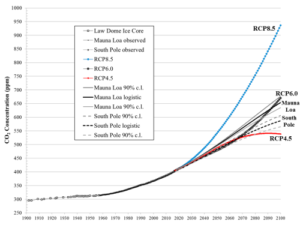by Carolyn Grambling, January 31, 2019 in ScienceNews
New findings from an international ocean observing network are calling into question the long-standing idea that global warming might slow down a big chunk of the ocean’s “conveyor belt.” The first 21 months of data from sensors moored across much of the North Atlantic are giving new insight into what controls the strength of the Atlantic Meridional Overturning Circulation, a system of currents that redistributes heat around much of the Western Hemisphere.
…
by P. Gosselin, January 29, 2019 in NoTricksZone
A paper very worth reading from the USA from January 2019 in Science (Geoffrey Gebbie of the Woods Hole Oceanographic Institution/Peter Huybers of Harvard University, hereinafter GH19) is titled “The Little Ice Age and 20th-century deep Pacific cooling”.
It shows fascinating science.
The authors evaluated temperature measurements made in the deep sea by the famous expedition of the “HMS Challenger” in the 1870s. The ship sailed the Atlantic and Pacific, and probably provided the first data on the oceans down to depths of over 2000 meters. The recalibration of the old data alone is a work of art! What the paper found: The Pacific down in depths has cooled from 1870 to today, the Atlantic not.
…
by Kevin Murphy in Judith Curry, January 28, 2019 in ClimateEtc.
A response to: “Is RCP8.5 an impossible scenario?”. This post demonstrates that RCP8.5 is so highly improbable that it should be dismissed from consideration, and thereby draws into question the validity of RCP8.5-based assertions such as those made in the Fourth National Climate Assessment from the U.S. Global Change Research Program.
Analyses of future climate change since the IPCC’s 5th Assessment Report (AR5) have been based on representative concentration pathways (RCPs) that detail how a range of future climate forcings might evolve.
Several years ago, a set of RCPs were requested by the climate modeling research community to span the range of net forcing from 2.6 W/m2 to 8.5 W/m2 (in year 2100 relative to 1750) so that physics within the models could be fully exercised. Four of them were developed and designated as RCP2.6, RCP4.5, RCP6.0 and RCP8.5. They have been used in ongoing research and as the basis for impact analyses and future climate projections.
…

Figure 2. History and forecasts of CO2 concentration. RCP8.5 is defined by 936 ppm in 2100.
La géologie, une science plus que passionnante … et diverse

